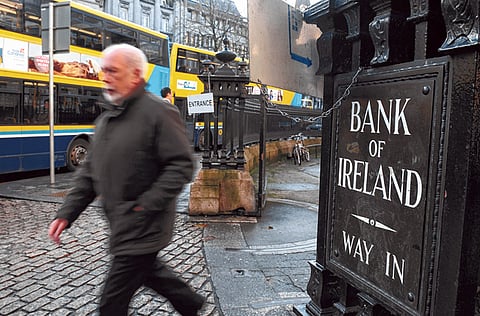Irish bailout may cost 85b euros
The plan includes spending cuts and tax hikes to reduce deficit

Dublin: Irish Prime Minister Brian Cowen said the EU-IMF bailout fund for his cash-strapped country could total 85 billion euros (Dh417 billion) but has yet to be agreed.
Cowen told lawmakers yesterday that "an amount in the order of 85 billion euros has been discussed.'' He was responding to Irish media reports that this would be the total aid offered.
The premier spoke hours before his government published a four-year austerity plan, a prerequisite for Ireland's receipt of any EU-IMF aid.
The plan seeks 10 billion euros in spending cuts and 5 billion euros in tax increases so that Ireland's 2014 deficit can be reduced to 3 per cent of gross domestic product, the Eurozone limit. Ireland's deficit this year is forecast to reach 32 per cent, a modern European record.
Plans
Ireland's government announced plans yesterday to cut welfare spending sharply and raise taxes to help pay for the country's catastrophic banking crisis and meet the terms of an international bailout.
The Irish Independent newspaper said the situation was so critical that Dublin could pump extra cash into the ailing banks as early as this weekend, without waiting for an expected 85 billion euros in European and International Monetary Fund loans.
The government is set to take a majority stake in top lender Bank of Ireland, the only major bank not already under state control, after a crash in banks' share prices this week diluted shareholders' equity.
Ratings agency Standard and Poor's cut Ireland's credit rating to A from AA- and placed it on negative watch, sending Irish government bond spreads over safe-haven German Bunds even wider and the cost of insuring Irish sovereign debt against default still higher.
An erosion of support from coalition partners this week means Prime Minister Brian Cowen is unlikely to survive in office much beyond the New Year to implement the plans.
But his successor's hands will be tied by the terms of an agreement to be signed with the EU and the IMF, and Ireland's financial crisis will leave little scope to revise them.
"There has never been such a political shambles in the history of the State," Irish Times columnist Stephen Collins wrote. "The coalition crumbling just days before the publication of a four-year budgetary strategy has added a whole new layer of uncertainty to an already volatile situation."
One protester picketing parliament wore a sign proclaiming: "IMF****d and EU too?"
Budget in doubt
The four-year spending plan is the first step before Cowen can lay out his budget for next year on December 7, the fate of which could be in doubt. The IMF and EU offered assistance on Sunday, but say it depends on the budget being passed.
Publication of the austerity plan will raise pressure on the main opposition Fine Gael party to come off the fence and say whether it will back the budget, oppose it or abstain.
Leader Enda Kenny said on Tuesday the party would act in the "national interest", hinting it could let the budget pass in return for a firm date for an early election.
Bond markets that forced Cowen to agree to the bailout in recent days will be checking the four-year plan's sums and could punish him further if they think they do not add up.



